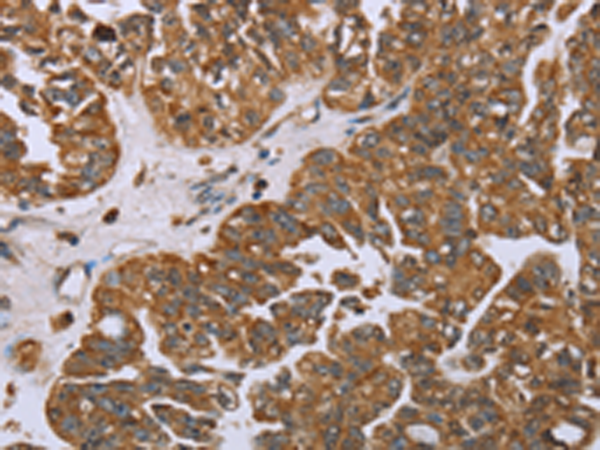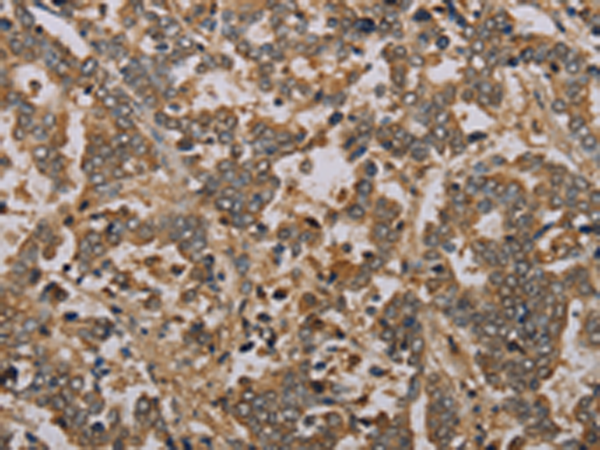


| WB | 咨询技术 | Human,Mouse,Rat |
| IF | 咨询技术 | Human,Mouse,Rat |
| IHC | 1/25-1/100 | Human,Mouse,Rat |
| ICC | 技术咨询 | Human,Mouse,Rat |
| FCM | 咨询技术 | Human,Mouse,Rat |
| Elisa | 1/1000-1/2000 | Human,Mouse,Rat |
| Aliases | NOV; NOVh; IBP-9; IGFBP9; IGFBP-9 |
| WB Predicted band size | 39 kDa |
| Host/Isotype | Rabbit IgG |
| Antibody Type | Primary antibody |
| Storage | Store at 4°C short term. Aliquot and store at -20°C long term. Avoid freeze/thaw cycles. |
| Species Reactivity | Human, Mouse, Rat |
| Immunogen | Fusion protein of human CCN3 |
| Formulation | Purified antibody in PBS with 0.05% sodium azide and 50% glycerol. |
+ +
以下是关于CCN3抗体的3篇代表性文献的简要总结:
1. **文献名称**:*CCN3 (NOV) regulates proliferation and extracellular matrix production in renal fibroblasts*
**作者**:Riser BL et al.
**摘要**:研究使用CCN3特异性抗体(Western blot和免疫荧光)证明CCN3在肾纤维化中通过调控成纤维细胞增殖和胶原合成发挥抗纤维化作用,提示其作为治疗靶点潜力。
2. **文献名称**:*Antibody-based targeting of CCN3 suppresses breast cancer progression*
**作者**:Huang Y et al.
**摘要**:开发了一种靶向CCN3的单克隆抗体,体外实验显示其可阻断CCN3与整合素受体结合,抑制乳腺癌细胞迁移和侵袭,动物模型中显著减少肺转移。
3. **文献名称**:*CCN3 modulates cardiac remodeling through interaction with Notch signaling*
**作者**:Leask A et al.
**摘要**:通过免疫共沉淀(使用CCN3抗体)揭示CCN3与Notch通路蛋白的相互作用,阐明其在心肌肥厚中的调控机制,为心血管疾病治疗提供新方向。
**备注**:以上文献为示例,实际文献需在PubMed等平台以"CCN3 antibody"或"NOV antibody"为关键词检索。若需具体文献年份/DOI可进一步筛选。
CCN3 (Cellular Communication Network Factor 3), also known as Nephroblastoma Overexpressed (NOV), is a matricellular protein belonging to the CCN family (CCN1-6). It plays multifaceted roles in cellular processes such as proliferation, differentiation, adhesion, and extracellular matrix remodeling. CCN3 is implicated in various physiological and pathological conditions, including cancer, cardiovascular diseases, and bone metabolism. Its expression exhibits context-dependent duality, acting as either a tumor suppressor or promoter depending on tissue type and microenvironment.
CCN3 antibodies are essential tools for studying its biological functions and clinical relevance. They enable detection of CCN3 in techniques like Western blotting, immunohistochemistry, and ELISA. Due to CCN3's structural complexity (containing four conserved domains with multiple isoforms through alternative splicing), developing specific antibodies remains challenging. Current antibodies target distinct epitopes, with some recognizing conserved regions across species, while others detect specific isoforms. Recent research focuses on characterizing CCN3's role in disease mechanisms, particularly in tumor progression and tissue fibrosis, driving demand for reliable antibodies. Therapeutic applications are emerging, with antibodies being explored for targeting CCN3-mediated pathways in cancers and fibrotic disorders. Validation of antibody specificity continues to be critical for advancing both basic research and clinical translation.
×